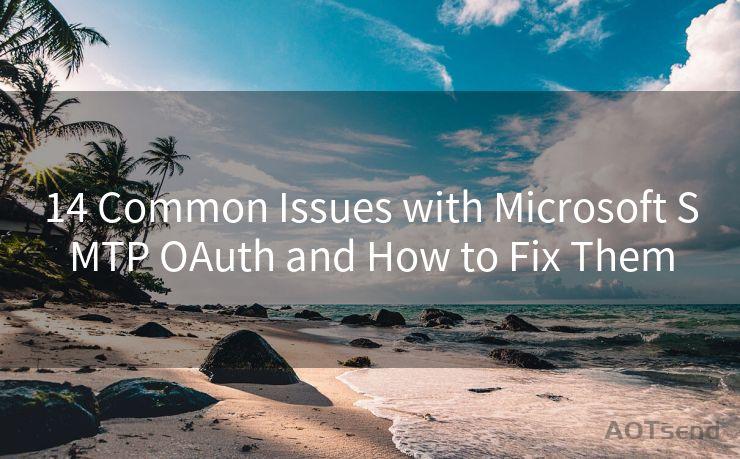14 Common Issues with Microsoft SMTP OAuth and How to Fix Them




When it comes to email communication, Microsoft SMTP OAuth provides a secure method for sending emails. However, like any other technology, it's not without its issues. In this blog post, we'll explore 14 common problems users face when using Microsoft SMTP OAuth and how to resolve them.
1. Authentication Failures
Authentication failures are a common issue when setting up Microsoft SMTP OAuth. This usually happens due to incorrect credentials or misconfigured settings. To fix this, double-check your client ID, secret, and tenant ID. Ensure that you have granted the necessary permissions in Azure and that your application is properly registered.
2. Access Token Expiration
Access tokens have a limited lifespan. If your token expires, you'll need to refresh it to continue sending emails. Implement a mechanism to handle token expiration and automatically request new tokens before they expire.
🔔🔔🔔
【AOTsend Email API】:AOTsend is a Managed Email Service for sending transactional emails. Support Email Types: reminders, authentication, confirmations, notifications, verification codes, invoices, password resets, account activations, billing statements, two-factor authentication (2FA), and one-time passwords (OTP) emails, etc. $0.28 per 1000 Emails. 99% Delivery, 98% Inbox Rate.
You might be interested in:
Why did we start the AOTsend project, Brand Story?
What is a Managed Email API, How it Works?
Best 25+ Email Marketing Platforms (Authority,Keywords&Traffic Comparison)
Best 24+ Email Marketing Service (Price, Pros&Cons Comparison)
Email APIs vs SMTP: How they Works, Any Difference?
3. Scope Issues
If you encounter scope-related errors, it means your application doesn't have the necessary permissions to perform the requested action. Review the scopes you've granted your application and ensure they align with the functionalities you're trying to use.
4. TLS/SSL Errors
When using SMTP OAuth, it's crucial to have a secure connection. If you encounter TLS/SSL errors, check your server's SSL/TLS configuration. Ensure your server supports the required protocols and that the certificates are up to date and valid.
5. Connection Timeouts
Connection timeouts can occur due to various reasons, such as network issues or server overloads. To resolve this, check your network connection and ensure the SMTP server is reachable. Additionally, consider increasing the timeout settings in your email client.
6. Incorrect SMTP Settings
Incorrect SMTP settings can cause a range of issues. Verify that you're using the correct SMTP server address, port, and encryption method. Also, confirm that your email client supports the required authentication method.
7. Throttling and Rate Limiting
Microsoft may throttle or rate-limit your application if it detects unusual activity or excessive requests. To avoid this, ensure you're not sending emails too frequently and consider implementing retry logic with exponential backoff.
8. Error Handling and Logging
Proper error handling and logging are crucial for debugging issues. Implement robust error handling mechanisms to capture and log detailed information about any failures. This will help you quickly identify and resolve problems.
9. Compatibility Issues
Not all email clients or libraries fully support Microsoft SMTP OAuth. Ensure your email client or library is up to date and compatible with the authentication method you're using.
10. Tenant and Application Configuration
Misconfigured tenant or application settings can cause authentication and authorization issues. Regularly review and update your Azure tenant and application configurations to ensure they align with Microsoft's best practices.
11. OAuth 2.0 Flow Misunderstandings
The OAuth 2.0 authorization flow can be complex. Make sure you understand the flow correctly, including obtaining an access token, handling refreshes, and protecting your client secret.
12. Library or Framework Bugs
Sometimes, issues may arise due to bugs in the libraries or frameworks you're using. Keep your libraries and frameworks up to date, and check for any known issues or patches.
13. Insufficient Privileges
If your application attempts to perform actions it doesn't have privileges for, it will fail. Ensure your application has the necessary permissions and roles assigned in Azure.
14. Unhandled Exceptions
Unhandled exceptions can cause your application to crash or behave unexpectedly. Implement exception handling to catch and manage any unexpected errors gracefully.
By addressing these common issues, you can ensure a smoother and more reliable experience when using Microsoft SMTP OAuth for email communication. Regularly review and update your configurations, permissions, and error handling mechanisms to maintain a robust and secure email system.





Scan the QR code to access on your mobile device.
Copyright notice: This article is published by AotSend. Reproduction requires attribution.
Article Link:https://www.mailwot.com/p3810.html



